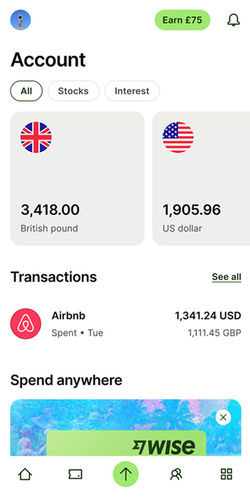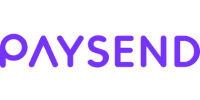Find the best ways to transfer money to Cameroon
Compare money transfer deals for sending XAF.
Find the best, cheapest, and easiest ways to send money to Cameroon at the best XAF exchange rates.
Read on for the best deals, expert information, and all you need to transfer money to Cameroon.
Send money to Cameroon
"Over 16 million customers use Wise, mostly for their excellent mobile app, transparent fee structure & use of mid-market rates. Now increasingly used for larger transfers."
"Over 16 million customers use Wise, mostly for their excellent mobile app, transparent fee structure & use of mid-market rates. Now increasingly used for larger transfers."
"Over 16 million customers use Wise, mostly for their excellent mobile app, transparent fee structure & use of mid-market rates. Now increasingly used for larger transfers."
"Over 16 million customers use Wise, mostly for their excellent mobile app, transparent fee structure & use of mid-market rates. Now increasingly used for larger transfers."
"Over 16 million customers use Wise, mostly for their excellent mobile app, transparent fee structure & use of mid-market rates. Now increasingly used for larger transfers."
"Over 16 million customers use Wise, mostly for their excellent mobile app, transparent fee structure & use of mid-market rates. Now increasingly used for larger transfers."
"Revolut has 50+ million customers globally. You can hold up to 36 currencies in the app and send money quickly in 70+ currencies to 160+ countries."
"Revolut has 50+ million customers globally. You can hold up to 36 currencies in the app and send money quickly in 70+ currencies to 160+ countries."
"Revolut has 50+ million customers globally. You can hold up to 36 currencies in the app and send money quickly in 70+ currencies to 160+ countries."
"Xoom, a PayPal service, allows you to send money in more than 160 countries. You can send cash for over-the-counter pickup or home delivery, as well as send by bank transfer or debit card."
"Xoom, a PayPal service, allows you to send money in more than 160 countries. You can send cash for over-the-counter pickup or home delivery, as well as send by bank transfer or debit card."
"Xoom, a PayPal service, allows you to send money in more than 160 countries. You can send cash for over-the-counter pickup or home delivery, as well as send by bank transfer or debit card."
"Paysend has transparent fees and rates, with transfer sent within seconds to your recipient's bank. They also have global 24/7 support for any enquiries, and bank-level security."
"Paysend has transparent fees and rates, with transfer sent within seconds to your recipient's bank. They also have global 24/7 support for any enquiries, and bank-level security."
"Paysend has transparent fees and rates, with transfer sent within seconds to your recipient's bank. They also have global 24/7 support for any enquiries, and bank-level security."
"Moneygram is a well established service with over 80 years in the sector. They support over 200 countries worldwide and have over 440,000 retail locations."
"Moneygram is a well established service with over 80 years in the sector. They support over 200 countries worldwide and have over 440,000 retail locations."
"Moneygram is a well established service with over 80 years in the sector. They support over 200 countries worldwide and have over 440,000 retail locations."
How to get the best rate when sending money to Cameroon
Always compare rates
Don't pay more than you have to. Use our live comparison tool to make sure you aren't missing the best XAF rates.
Choose a provider
Select the provider that offers you the most XAF and fits your needs.
Click, sign up & transfer
Follow the steps & make your transfer. Your XAF will soon be on the way.
We found Wise to be the best way to send money to Cameroon.
After testing and reviewing 5 money transfer providers servicing Cameroon, Wise came out on top.
Wise offers quick transfers, adds a -0.04% markup on XAF transfers, and costs $60.74 in fees.
This makes it the best option for a mix of cost, speed & features for XAF transfers.

Paysend is the cheapest way to send money to Cameroon
Paysend charges $0 per transfer and adds a 0.37% markup on top of the CFA Franc BEAC exchange rate.
bank transfer is the cheapest funding option when sending money to Cameroon. Pair it together with Paysend, to get the most out of your XAF transfer.

The fastest way to send money to Cameroon: Paysend
Based on a $7,000 transfer and our comparison data for XAF transfers, Paysend is the quickest option for sending XAF to Cameroon.
With Paysend, the transfer time to Cameroon is minutes - 24 hours.
They charge $0 in fees and apply a 0.37% markup on the ‘real’ XAF rate. This is 0% cheaper than the second-best provider.
For the best balance between speed and cost, we suggest using a deposit for CFA Franc BEAC transfers.

Wise is the easiest way to send money to Cameroon
Wise is very transparent with its fees, charging $60.74 and -0.04% markup on XAF transfers.
They offer multiple deposit options, have good customer service, and take less than 5 minutes to get started with.

Consider this before sending money to Cameroon
Don't settle for the first option. Always compare ways to send money to Cameroon to find out about fees, speed, and reliability.
Our analysis included 5 providers that operate in Cameroon.
Through this, you get a comprehensive view of all the options you have when sending money to Cameroon.
Making large money transfers to Cameroon
When sending large amounts of CFA Franc BEAC to Cameroon, it's important to consider factors like the limits, XAF rates, customer support, as well as legal and government-imposed restrictions in Cameroon.
Wise is our top recommendation for moving large amounts of XAF.
Whether you're purchasing property in Cameroon, need to pay tuition fees, have a wedding there, or transfer money for business in Cameroon, Wise will ensure a smooth and secure transaction.
Of all the companies we’ve tested and reviewed that specialize in large XAF transfers, Wise consistently ranked as the top-rated choice.
They charge $60.74 per transfer and apply -0.04% markup on top of the XAF exchange rate, making them perfect for moving big amounts.

Understanding the costs involved when moving money to Cameroon
When calculating the cost of money transfers to Cameroon, here's what really matters: the country of origin, amount, payment method, fees, and the markup on the XAF exchange rate.
Exchange rate markup
This is a percentage added on top of the "real" XAF rate (known as the mid-market rate).
Wise, for example, offers the best exchange rate. It adds -0.04% markup to the USD-XAF exchange rate (552.7735 XAF - -0.04% per US Dollar).
Transfer fees
These are fixed and/or percentage fees added for the service when sending money to Cameroon.
Let's imagine you want to send $7,000 from the US to Cameroon.
After analyzing 5 companies supporting CFA Franc BEAC, we found Paysend to offer the lowest fees ( $0 in fees and 0.37% markup).
However, exact fees vary by deposit method and the service, for example:
Bank transfers vary from $21 to $490.00000000000006
Debit cards range from $0 to $0
Credit card fees vary a lot, mainly due to cash advance fees and/or additional fees from your credit card provider.

Getting the best XAF rate when sending money to CFA Franc BEAC
The exchange rate is the value of the CFA Franc BEAC (XAF) compared to other currencies. Since it consistently moves up and down, sending at the high will give your receiver more XAF compared to the low.
In the past 7 days, the XAF exchange rate reached:
An average rate of 553.0412 CFA Franc BEAC per US Dollar
A high of 554.744 XAF per USD
And a low of 550.9466 XAF per US Dollar
The XAF/USD exchange rate has seen some movements. Making a transfer when the rate is close to 554.744 XAF/USD will result in more XAF received.
Wise is our top recommendation for sending CFA Franc BEAC, offering a markup of -0.04% which is 0% better than the next cheapest option.
Get notified when it’s the best time to transfer CFA Franc BEAC
Sign up for our rate alerts, and we’ll notify you when it’s the best time to send XAF!
Payment methods available for money transfers to Cameroon
The way you fund your transfer to Cameroon will impact the speed, cost, and amount of XAF your recipient receives.
Bank transfers
Bank transfer deposits are a common and reliable funding method for sending XAF, offered by most services covering Cameroon.
While bank transfers are typically more affordable, it may take up to 3 business days for the XAF to arrive in Cameroon.
In our testing of 5 providers, Revolut appeared as the cheapest option for bank transfers to Cameroon, charging $21 per transfer with a 0.2% markup (0.33% cheaper than the next cheapest money transfer company).
Avoid using wire transfers to Cameroon over the SWIFT network, as they are slower and more expensive due to the bank intermediaries on the way to Cameroon. Instead, choose ACH or your local network option.

Credit cards
A credit card deposit is another option for XAF transfers.
Based on our comparison of 5 companies serving Cameroon, there are a few available options.
To get the best deal, we as CC transfer fees and rates can vary a lot depending on where you are.
CC deposits are usually more expensive when sending CFA Franc BEAC, so if you can, opt for a bank transfer deposit or a debit card deposit.
Money transfer to Cameroon is an international transaction.
Your credit card company may apply a cash advance fee and higher interest rates for international payments to Cameroon. We recommend avoiding credit cards when sending money to Cameroon.

Debit and prepaid cards
Debit cards are typically faster but more expensive than bank deposits, with most XAF transfers completed within a few hours.
We recommend using Paysend for debit or prepaid card deposits.
With Paysend, you’ll pay a 0.37% markup on the XAF rate and $0 in fees when depositing money via the card. This is 0% cheaper than using the next cheapest option for transferring money to Cameroon.

How we analyze the market
We track the cost, speed, and product offerings of the leading money transfer services available in Cameroon.
Our comparison engine and algorithms evaluate providers based on over 25 factors, including transfer fees, ease of use, exchange rates, mobile apps, transfer times & customer support.
We also consider how these services are rated on platforms like TrustPilot, AppStore, and Google Play, giving you a comprehensive view of what to expect.
This thorough analysis helps you get the best available deal - every time you want to move money to Cameroon.
We also provide unbiased and detailed reviews of all the top money transfer companies. You can use these reviews to find the best service for your needs when sending money to Cameroon
For a deeper understanding of our commitment to integrity and transparency, we invite you to read our editorial policy and review methodology.

Related transfer routes
Send money from Cameroon
FAQs
Find answers to the most common questions on our dedicated FAQ page.
How much money can I transfer to Cameroon, and are there any limits?
Are there tax implications when sending funds to Cameroon?
What are the typical fees and exchange rates for sending XAF?
How long will it take for my money to reach Cameroon?
Can I schedule regular XAF transfers?
What currency is used in Cameroon?
Can I send XAF from any country?
How can I track my money transfer to Cameroon, and what should I do if something goes wrong?
Is it better to use my bank for XAF transfers?
Can I use MoneyTransfers.com to money transfers?
Tools & resources
Contributors












